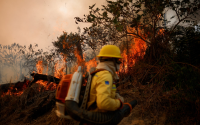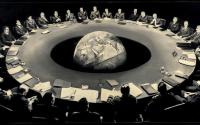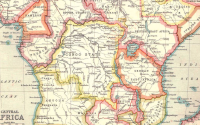7 December 2005Yahoo News
Carbon dioxide emission from international air carriers has almost doubled in the past 30 years with the increasing number of air travels, a study by the International Energy Agency said Tuesday.
The IEA said international air carriers released 354 million tons of CO2 worldwide in 2002, which is almost a quarter of total CO2 emission from Japan per year.
While the emission is likely to increase in the future, it is not subject to the 1997 Kyoto Protocol on global warming because of difficulty in appropriating reduction quotas.
In the study, the IEA calculated the CO2 emission based on the trade volume of air fuels in different countries. The United States topped the list in 2002 with 51 million tons of CO2, or 14 percent of the total, followed by Russia with 29 million tons. Japan, Britain and Germany followed, each accounting for about 21 million tons.
The IEA said CO2 emissions in the top five countries have more than doubled since the 1970s.
Among developing countries and regions, Thailand, Singapore Taiwan, India and Saudi Arabia were among the top, as many of them have hub airports for the Asia and Middle East regions.
Emission from the mainland China alone stood at 3 million tons, but jumped to 13 million tons with the addition of Hong Kong, surpassing all developing countries.
The European Union has decided to make CO2 emission from air fuel subject to the emission trading system in which countries that pollute more heavily can buy unused "credits" from those who are permitted to emit more.
The EU plans to require U.S. and Japanese airlines to cut their CO2 emissions and to fine them if they failed to meet targets. The EU is currently working to establish the system within next year.
Similarly, fuels used in ships plying international routes, also known as bunker oil, are not covered by the Kyoto Protocol, even though they are a major source of CO2 in globalizing economy.
Scientists have long debated how to regulate CO2 emission stemming from bunker oil since the 1990s during a process to establish the U.N. Framework Convention on Climate Change and negotiations for the Kyoto Protocol.
But no definitive framework has yet to be established, because of differences in the way countries handle data regarding the consumption of bunker oil. There is also no system to draw the line of responsibility between the ships' originating countries and destination countries.
Organizations such as the International Civil Aviation Organization and International Marine Organization have made technical discussions on the matter, but no significant progress has been made.
Establishing effective ways to regulate bunker oil is likely to be key agenda in the post-Kyoto process after 2013. Currently, the Intergovernmental Panel on Climate Change is drafting CO2 emission guidelines that take into account emissions from bunker oil.
The protocol aimed at curbing industrial emissions of greenhouse gases entered into force in February, seven years after its adoption at a U.N. conference in Kyoto in 1997, in a first attempt to control climate change.
The protocol obliges industrialized nations to reduce their CO2 and other greenhouse gas emissions from 1990 levels by an average of 5.2 percent between 2008 and 2012.






